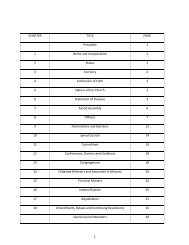Call Process Booklet
Call Process Booklet EDITED - Northwest Synod of Wisconsin
Call Process Booklet EDITED - Northwest Synod of Wisconsin
- No tags were found...
You also want an ePaper? Increase the reach of your titles
YUMPU automatically turns print PDFs into web optimized ePapers that Google loves.
<strong>Call</strong>ing a Seminary Graduate<br />
Of course, all pastors are seminary graduates. However, all pastors also need to start<br />
somewhere. Often times they are called “first call pastors.” There are some unique<br />
aspects to interviewing and calling a seminary graduate or first call pastor.<br />
Seminary graduates are fully trained and prepared to lead. Even though pastors<br />
develop and grow throughout their ministerial career, new pastors mature significantly<br />
during their first three years of ministry. Yet, because seminary graduates do not have<br />
years of pastoral experience, they are at a disadvantage in an interview process when<br />
compared to experienced pastors. Thus, if your congregation is an appropriate first call<br />
ministry site and receive the name of a seminary graduate, that person will be the only<br />
name received to interview. The final result of the interview may be “No” but the<br />
question is never whether any one pastor is “better” than another. The question is<br />
always, “Is this who God has in mind for our congregation?”<br />
Keep in mind, that a seminary graduate will not be able to reflect upon years of pastoral<br />
experience, but should be able to answer interview questions based upon their<br />
involvement in congregational life as a lay person and seminary training that involved<br />
clinical settings, contextual education experiences, and the internship year.<br />
Some seminary graduates are second or third career persons; if prior experience<br />
enhances a person’s skills for ministry, such experience may be considered in<br />
calculating compensation. According to the Salary Standards of our synod (page 3),<br />
Experience prior to ordination is calculated at the rate of ⅓ to ½ year for each year up<br />
to ten years of prior experience (up to 5 years credit).<br />
Seminary graduates are expected to participate in First <strong>Call</strong> Theological education<br />
during their first three years as a pastor. Congregations who receive a seminary<br />
graduate as their pastor are expected to encourage participation and fully support First<br />
<strong>Call</strong> Theological Education. New pastors connect with other new pastors and are<br />
guided by bishops, seminary faculty, experienced pastors, and churchwide staff as they<br />
reflect upon and process their developing identity and leadership as a pastor. To fund<br />
this expectation, the congregation needs to ensure the full amount of Continuing<br />
Education and Official Meeting dollars outlined in our synod’s Salary Standards is<br />
provided and that the full two weeks of time for continuing education is granted.<br />
Seminary graduates have just completed four years of extensive graduate school, one<br />
of which is an internship year, and are eager and ready to serve the church. That<br />
enthusiasm will be an asset to the mission of your congregation should you extend a<br />
call to a seminary graduate.<br />
Page 56<br />
Walking together † for the sake of mission † in God’s world<br />
944 24 ¼ Street • PO Box 107 • Chetek, WI 54728 • 715-859-6810 • Fax 715-859-6812 • www.nwswi.org




